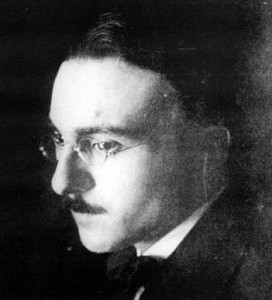
At midday at the end of spring
I had a dream like a photograph.
I watched Jesus Christ come down to Earth.
He came through the side of a hill
Becoming once again a boy,
Running around and rolling through the grass
Pulling out flowers and throwing them away
And laughing so hard he could be heard from afar.
He had run away from heaven
It was too much to act like
The second person of the Trinity.
In heaven it was all false, everything in discord
With the flowers and trees and stones.
In Heaven he had to remain serious all the time
And once in a while to become human again
And climbed towards the Cross, and always had to die
With a crown completely made of thorns
And his feet driven through by headed nails,
And even with a rag around his waist
Like the natives in the illustrations.
He was not even allowed to have a father and mother
Like the other children.
His father was two people -.
An old man named Joseph, who was a carpenter,
And he wasn’t his father;
And the other father was a mindless dove,
The only ugly dove in the world
Because he was not of the world nor was he a dove.
And his mother she had loved him always.
She wasn’t a woman; she was a bag
In which he came from heaven.
And intended that he, who was born of his mother,
And never had a father to love with respect,
Preached of gentleness and of justice!
One day when God was fast asleep
And the Holy Spirit was away flying,
He went to the box of miracles and stole three.
With the first he did not let anyone know he had escaped.
With the second he was created forever human and a boy.
With the third he created a Christ eternally stuck on the cross
And left him nailed to the cross in Heaven
Where it serves as a model for the others.
Afterwards he fled into the sun
And went down the first ray he caught.
Today we live in my village together.
He’s a beautiful child laughing and natural.
Wipes his nose with his right arm,
He goes sloshing in pools of water,
He picks flowers and likes them and forgets them.
Throws stones at donkeys,
Steals the fruit from orchards
And runs away crying and screaming from the dogs.
And, because you know they don’t like it
And everybody think’s it’s funny,
You chase after the girls
Who go into the houses on the paths
With buckets on their heads
And lift-up their skirts.
The one he taught me everything
Showed me how to look at things.
Pointed to me all the things in the flowers.
Showed me how the stones are fun
When we have them in our hand
And look slowly at them.
He tells me much that’s wrong with God
Says he is a foolish old man and infirm,
Always spitting on the floor
And speaking indecencies.
The VIrgin Mary takes the afternoons in eternity making socks.
And the Holy Spirit preens with his beak
And perches on the chairs which he fouls.
All in Heaven is foolish like the Catholic Church.
He tell’s me that God doesn’t perceive anything
Of the things that he created —
«Assuming he created them, that I doubt.» —
«He says for example that creatures sing his glory,
But creatures do not sing anything.
Creatures exist and nothing else
Which is why they are called creatures.»
And then weary of speaking ill of God,
The Baby Jesus falls asleep in my arms
And I take him in my arms back home.
……
He lives with me in my house in the middle of the hill
He is the Eternal Child, the God that was missing.
He is the human who is natural,
He is the divine who smiles and plays.
And that is why I know with certainty
That he is the true Baby Jesus.
And the child so human that he is divine
This is the day-to-day life of a poet,
And it’s because he’s always with me that I am always a poet.
And that my slightest glance
It fills me with feeling,
And the smallest sound, whatever it is,
It seems to talk to me.
The New Child that inhabits me right here
Gives me a helping hand to myself
And another whole thing exists
And so let those three go along their way as here there’s,
Leaping and singing and laughing
And enjoying of our mutual little secret
Which is known in every place
That there is no big mystery in the world
And that it is all worth it.
The Eternal Child accompanies-me always.
The direction of my gaze is his finger pointing.
Mine ears are attentive joyfully to all sounds
That are the tickling he makes playing with my ears.
We get on so well with each other.
In the company of everything
We never think of each other,
But live together as a couple
With an intimate agreement
Like the right and left hand.
At dusk we played the five pebbles
At the step of the house,
Serious as befits a God and a poet,
And as if every stone
Were a whole universe
And therefore a great danger to her
In letting her hit the ground.
Later on I’ll tell him stories of things only of men
And he smiles because everything is incredible.
Laughing at the kings and those who are not kings,
And he has pity in hearing of the wars,
And the businesses, and the ships
Which are fuming in the air of the high seas.
Because he knows that it all lacks that truth
That a flower has in bloom
And that moves in the sunlight
The variations in the hills and the vale
And how whitewashed walls hurt your eyes.
Then he falls asleep and I’ll lay him down.
I’ll take him in my arms into the house
And I’ll lay him down, undressing him gently
And follow a very natural ritual
Just like every mother until he is naked.
He sleeps within my soul.
And at times he wakes up at night
And plays with my dreams.
He turns a few upside down,
Putting one on top of another
And claps his hands alone
Smiling for my sleep.
……
When I die, little boy
Let me be the child, the smallest one.
Hold me in your arms
And take me inside your house.
Undress my being tired and human
And lie me down in your bed.
Tell me stories, if I wake up,
So I return to sleep.
And give me dreams for me to play
Until such a time is born one day
When what you know is what it is.
……
This Is the story of my Baby Jesus.
This is the reason that I understand
And it cannot be any more truthful
Than everything that those philosophers think
And everything that those religions teach.

David Scanlon – England – (1963 – )
Pessoa, F. (2018) Poems of Alberto Caeiro. In Portuguese and translated to English by David Scanlon. The Foolish Poet Press, Wilmslow, Portugal. THE KEEPER OF FLOCKS - VIII. Page Number 23.

Num meio-dia de fim de Primavera
Tive um sonho como uma fotografia.
Vi Jesus Cristo descer à terra.
Veio pela encosta de um monte
Tornado outra vez menino,
A correr e a rolar-se pela erva
E a arrancar flores para as deitar fora
E a rir de modo a ouvir-se de longe.
Tinha fugido do céu.
Era nosso demais para fingir
De segunda pessoa da Trindade.
No céu era tudo falso, tudo em desacordo
Com flores e árvores e pedras.
No céu tinha que estar sempre sério
E de vez em quando de se tornar outra vez homem
E subir para a cruz, e estar sempre a morrer
Com uma coroa toda à roda de espinhos
E os pés espetados por um prego com cabeça,
E até com um trapo à roda da cintura
Como os pretos nas ilustrações.
Nem sequer o deixavam ter pai e mãe
Como as outras crianças.
O seu pai era duas pessoas —
Um velho chamado José, que era carpinteiro,
E que não era pai dele;
E o outro pai era uma pomba estúpida,
A única pomba feia do mundo
Porque não era do mundo nem era pomba.
E a sua mãe não tinha amado antes de o ter.
Não era mulher: era uma mala
Em que ele tinha vindo do céu.
E queriam que ele, que só nascera da mãe,
E nunca tivera pai para amar com respeito,
Pregasse a bondade e a justiça!
Um dia que Deus estava a dormir
E o Espírito Santo andava a voar,
Ele foi à caixa dos milagres e roubou três.
Com o primeiro fez que ninguém soubesse que ele tinha fugido.
Com o segundo criou-se eternamente humano e menino.
Com o terceiro criou um Cristo eternamente na cruz
E deixou-o pregado na cruz que há no céu
E serve de modelo às outras.
Depois fugiu para o Sol
E desceu pelo primeiro raio que apanhou.
Hoje vive na minha aldeia comigo.
É uma criança bonita de riso e natural.
Limpa o nariz ao braço direito,
Chapinha nas poças de água,
Colhe as flores e gosta delas e esquece-as.
Atira pedras aos burros,
Rouba a fruta dos pomares
E foge a chorar e a gritar dos cães.
E, porque sabe que elas não gostam
E que toda a gente acha graça,
Corre atrás das raparigas
Que vão em ranchos pelas estradas
Com as bilhas às cabeças
E levanta-lhes as saias.
A mim ensinou-me tudo.
Ensinou-me a olhar para as coisas.
Aponta-me todas as coisas que há nas flores.
Mostra-me como as pedras são engraçadas
Quando a gente as tem na mão
E olha devagar para elas.
Diz-me muito mal de Deus.
Diz que ele é um velho estúpido e doente,
Sempre a escarrar no chão
E a dizer indecências.
A Virgem Maria leva as tardes da eternidade a fazer meia.
E o Espírito Santo coça-se com o bico
E empoleira-se nas cadeiras e suja-as.
Tudo no céu é estúpido como a Igreja Católica.
Diz-me que Deus não percebe nada
Das coisas que criou —
«Se é que ele as criou, do que duvido.» —
«Ele diz, por exemplo, que os seres cantam a sua glória,
Mas os seres não cantam nada.
Se cantassem seriam cantores.
Os seres existem e mais nada,
E por isso se chamam seres.»
E depois, cansado de dizer mal de Deus,
O Menino Jesus adormece nos meus braços
E eu levo-o ao colo para casa.
……
Ele mora comigo na minha casa a meio do outeiro.
Ele é a Eterna Criança, o deus que faltava.
Ele é o humano que é natural,
Ele é o divino que sorri e que brinca.
E por isso é que eu sei com toda a certeza
Que ele é o Menino Jesus verdadeiro.
E a criança tão humana que é divina
É esta minha quotidiana vida de poeta,
E é porque ele anda sempre comigo que eu sou poeta sempre.
E que o meu mínimo olhar
Me enche de sensação,
E o mais pequeno som, seja do que for,
Parece falar comigo.
A Criança Nova que habita onde vivo
Dá-me uma mão a mim
E a outra a tudo que existe
E assim vamos os três pelo caminho que houver,
Saltando e cantando e rindo
E gozando o nosso segredo comum
Que é o de saber por toda a parte
Que não há mistério no mundo
E que tudo vale a pena.
A Criança Eterna acompanha-me sempre.
A direcção do meu olhar é o seu dedo apontando.
O meu ouvido atento alegremente a todos os sons
São as cócegas que ele me faz, brincando, nas orelhas.
Damo-nos tão bem um com o outro
Na companhia de tudo
Que nunca pensamos um no outro,
Mas vivemos juntos e dois
Com um acordo íntimo
Como a mão direita e a esquerda.
Ao anoitecer brincamos as cinco pedrinhas
No degrau da porta de casa,
Graves como convém a um deus e a um poeta,
E como se cada pedra
Fosse todo um universo
E fosse por isso um grande perigo para ela
Deixá-la cair no chão.
Depois eu conto-lhe histórias das coisas só dos homens
E ele sorri, porque tudo é incrível.
Ri dos reis e dos que não são reis,
E tem pena de ouvir falar das guerras,
E dos comércios, e dos navios
Que ficam fumo no ar dos altos mares.
Porque ele sabe que tudo isso falta àquela verdade
Que uma flor tem ao florescer
E que anda com a luz do Sol
A variar os montes e os vales
E a fazer doer aos olhos os muros caiados.
Depois ele adormece e eu deito-o.
Levo-o ao colo para dentro de casa
E deito-o, despindo-o lentamente
E como seguindo um ritual muito limpo
E todo materno até ele estar nu.
Ele dorme dentro da minha alma
E às vezes acorda de noite
E brinca com os meus sonhos.
Vira uns de pernas para o ar,
Põe uns em cima dos outros
E bate as palmas sozinho
Sorrindo para o meu sono.
……
Quando eu morrer, filhinho,
Seja eu a criança, o mais pequeno.
Pega-me tu ao colo
E leva-me para dentro da tua casa.
Despe o meu ser cansado e humano
E deita-me na tua cama.
E conta-me histórias, caso eu acorde,
Para eu tornar a adormecer.
E dá-me sonhos teus para eu brincar
Até que nasça qualquer dia
Que tu sabes qual é.
……
Esta é a história do meu Menino Jesus.
Por que razão que se perceba
Não há-de ser ela mais verdadeira
Que tudo quanto os filósofos pensam
E tudo quanto as religiões ensinam?

Fernando Pessoa – Portugal – (1888 - 1935)
Caeiro, A. (1914)[1946] ”O Guardador de Rebanos” In Poemas de Alberto Caeiro (Nota explicativa e notas de João Gaspar Simões e Luiz de Montalvor.) Ática: Lisboa.
Work is no longer protected by copyright.



 Constantine Petrou Cavafy
Constantine Petrou Cavafy Fernando Pessoa
Fernando Pessoa Poemhunter.com
Poemhunter.com Poetry Foundation
Poetry Foundation ISBNdb.com
ISBNdb.com Open library
Open library